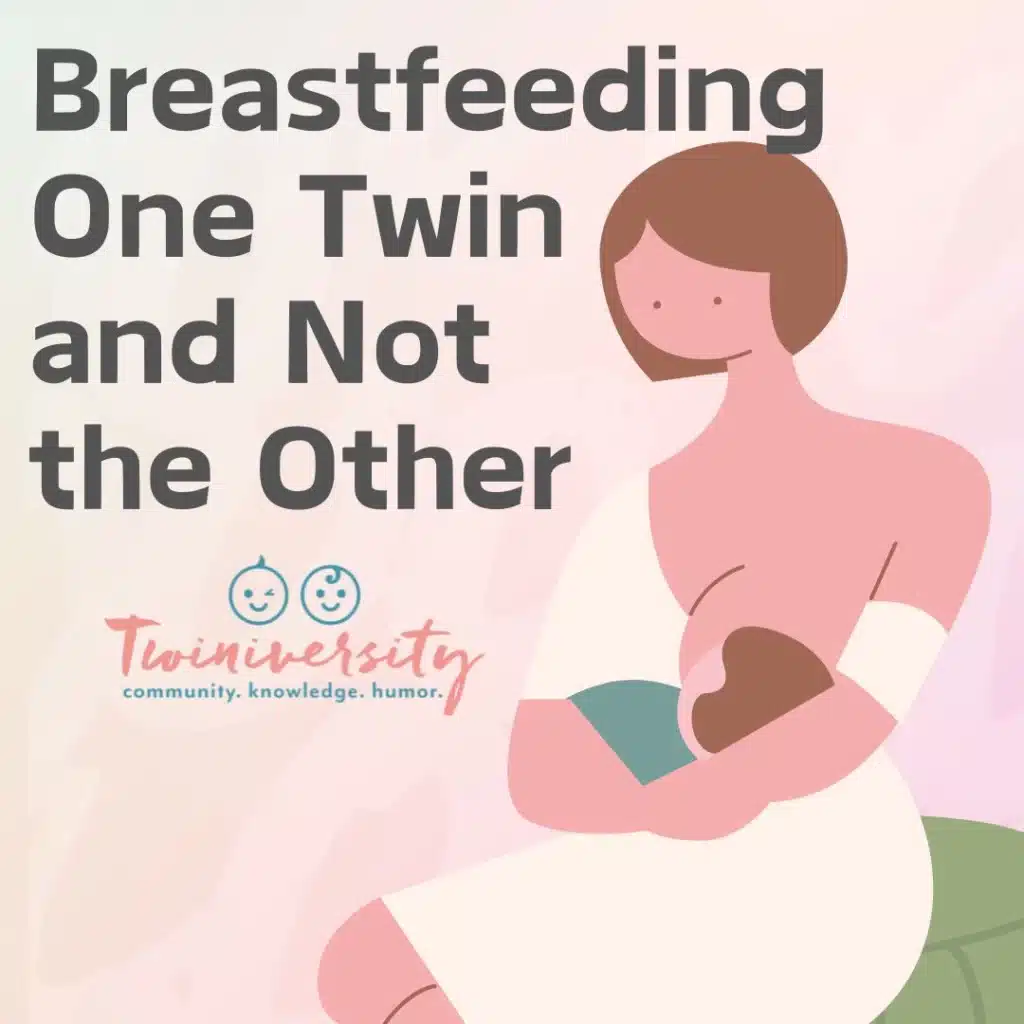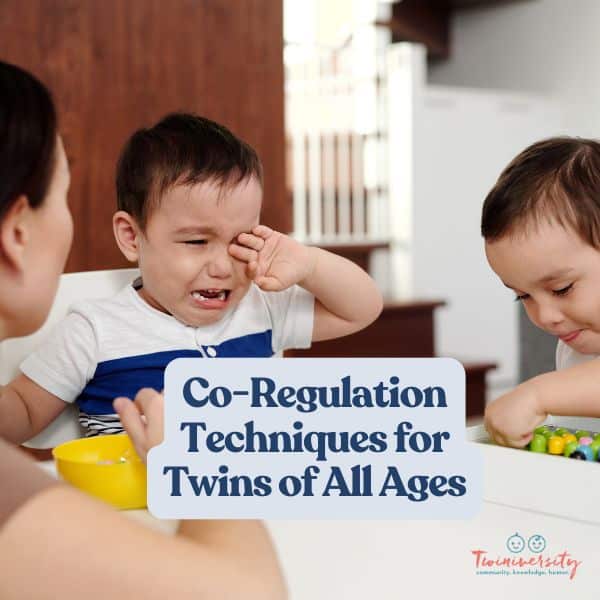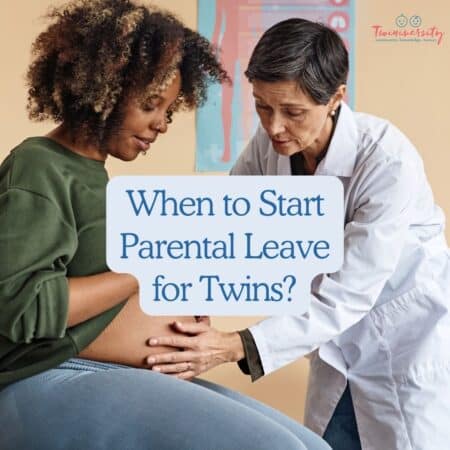Last updated on July 22nd, 2024 at 06:40 pm
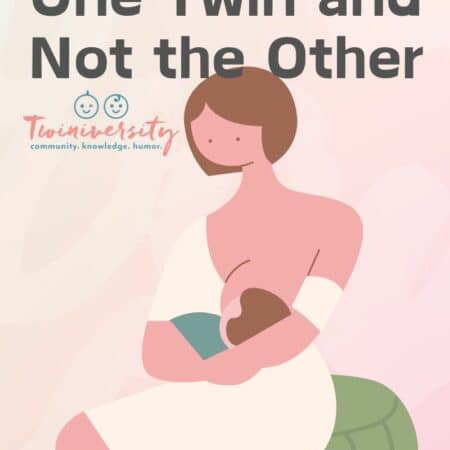
Most twin moms-to-be worry they will not be able to breastfeed two babies. Breastfeeding two babies is not an easy task and is understandably sometimes impossible. So, if it turns out you can’t breastfeed both babies, do you abandon your plan and move on to formula, or do you just breastfeed one of the babies? Join twin mom Courtney as she talks us through her breastfeeding journey when only nursing one of her twins.
At 8 weeks pregnant, I found out I was carrying twins. My first reaction? He must be kidding. My second? “Shit!!!” The first hours, days, and weeks after finding out the news was a rollercoaster of emotions, questions, worries, and hopes. Of course, I started voraciously googling – how could I prepare? What did I need to know? Of all the content I inhaled in those early weeks, one of the key themes was to ensure your twins feel equally loved and valued as individuals. There were tips like “make sure to take pictures of them individually” or “don’t always dress them in matching outfits.” So many do’s and don’ts to absorb – my head was spinning.
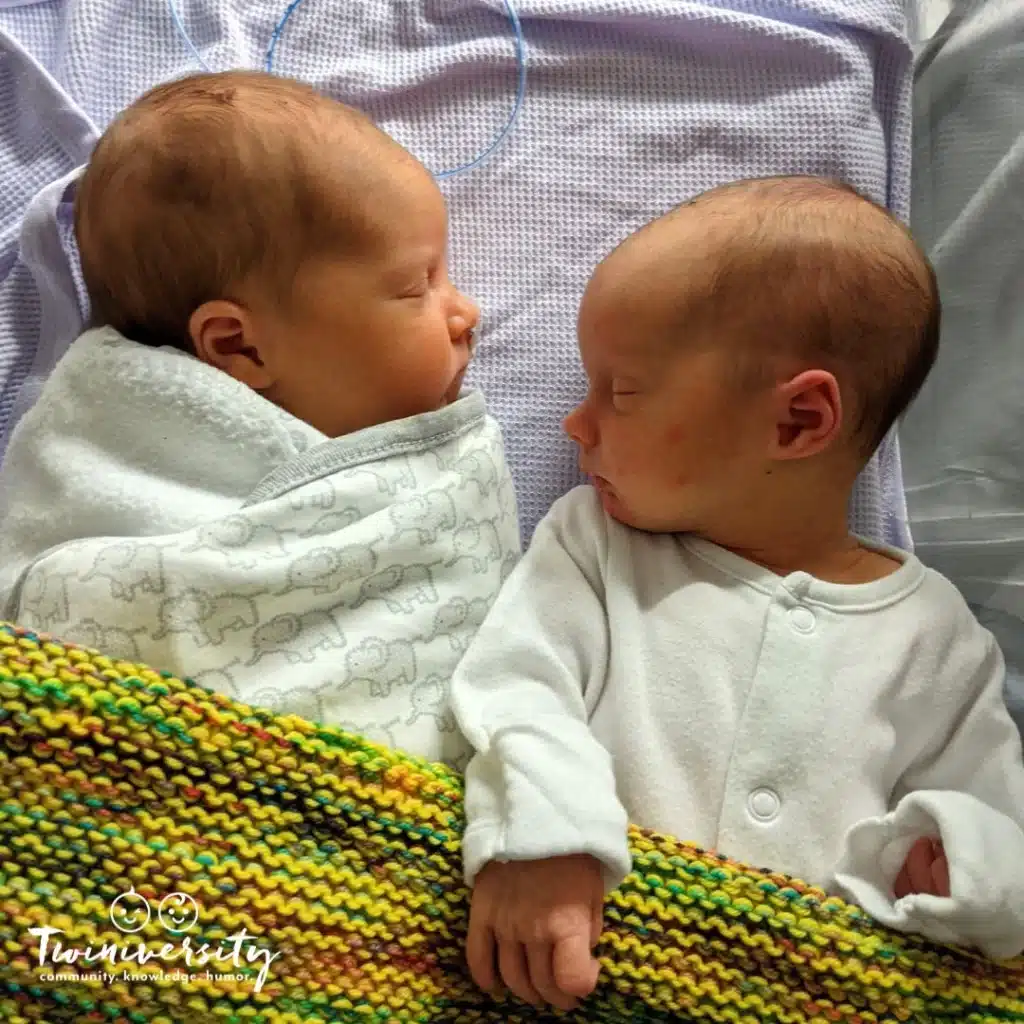
Birth Story
My non-identical girls arrived vaginally at 37+2 after a 50-hour labor, post-induction (that’s a story for another time)! They were small (4lbs, 15oz, and 6lbs, respectively), and they had low blood sugar and jaundice. Feeding was immediately a challenge, and they lost more than 10% of their birth weight in the first few days. The medical intervention for all of these complications was a feeding plan. They were prescribed formula “top-ups” after every 20-minute breastfeeding session.
Breastfeeding Isn’t So Easy!
I had fantasized about exclusively breastfeeding. I had already invested in all the gear, researched a lactation consultant, and completed an antenatal course. I thought I was prepared and ready to advocate for myself and to troubleshoot any difficulties. That first week in the hospital shattered my confidence. Why was this so hard? The midwives assured me that both babies’ latches looked good and that I was “doing everything right.” However, breastfeeding was painful, and the girls were not gaining weight at the expected rate. We were discharged home after a week, but when the midwife arrived to weigh them the next day, she nearly sent us back. Cue the tears! My instincts were screaming that something was not right.
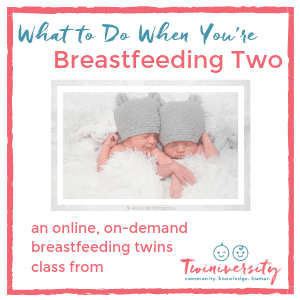
Worried about breastfeeding twins? What To Do When You’re Breastfeeding Two is an on-demand online breastfeeding twins class made just for YOU! This course was created by Twiniversity in partnership with Judy Teibloom-Mishkin, IBCLC. Click here to learn more…
When my lactation consultant arrived a few days later, I was ready to give up. She observed them nursing and immediately diagnosed both girls with tongue ties. For the first time during this breastfeeding journey, I was filled with hope!
Tongue-Tied Twinnies
We brought in a tongue-tie specialist as the waiting list for the hospital clinic was several weeks long, and I knew I would not make it that long. My sanity was hanging on by a thread. The specialist confirmed the diagnosis and provided us with a huge amount of information about the risks and benefits of tongue tie release versus non-intervention. She explained that even after a release, tongue ties can reattach and that this could impact a baby’s ability to latch.
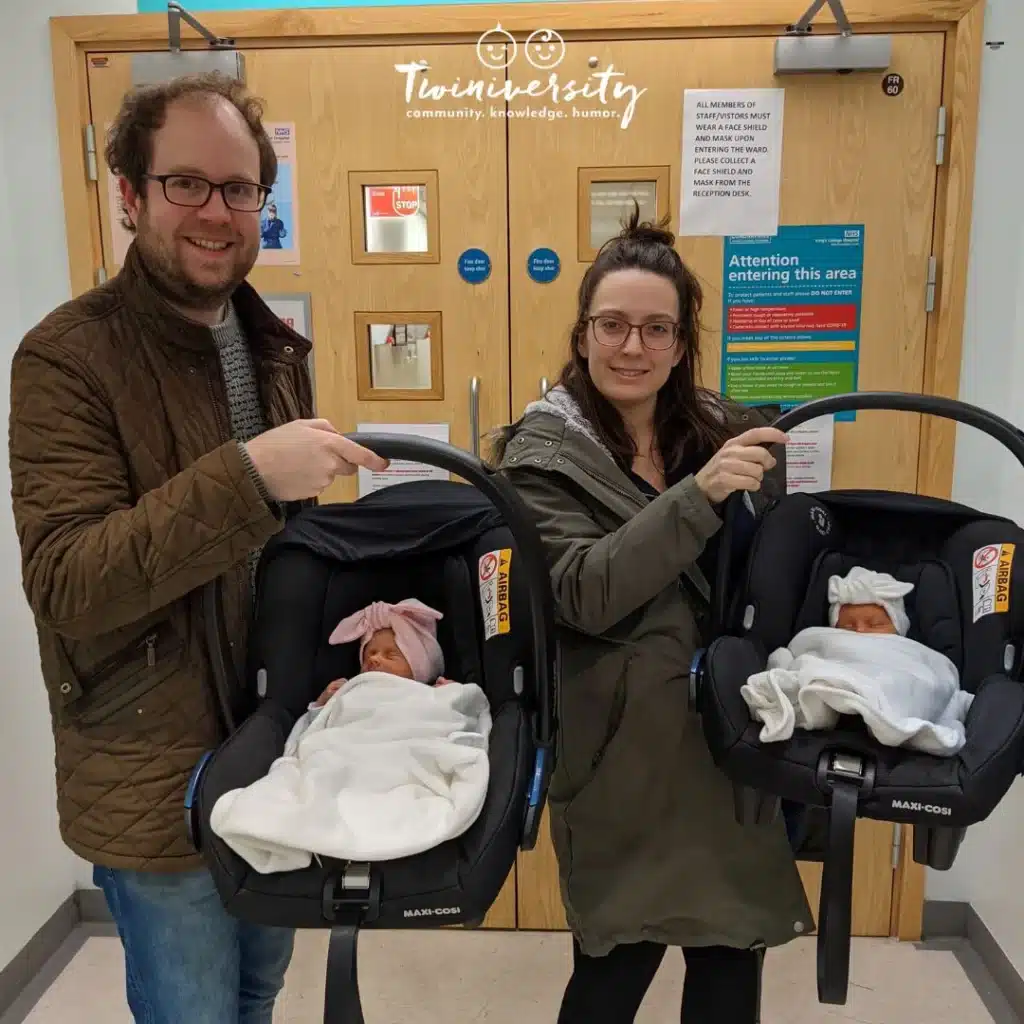
We knew that there was a chance the girls would be unable to continue breastfeeding if we intervened. We also knew that without intervention, they 100% would lose access to breastfeeding because I could not continue for my own mental health. My husband and I took in all of the information and reflected on the past 4 and a half weeks. We decided the potential benefits outweighed the risks and agreed to the release procedure for both babies. They were done in our home that day with minimal trauma.
Breastfeeding Trials and Tribulations
Improvements in my feeding experience were not immediate, but over the next days and weeks (it’s all a blur now), one baby, Twin A, became increasingly efficient at the breast, and her latch became less painful for me. We found our groove and eventually dropped formula top-offs during the day when she was about 2 months old. She continued accepting bottles of expressed milk or formula overnight for another month until she stopped taking bottles altogether at 3 months old. Even then, she was a girl who knew what she wanted and accepted nothing less. I respect it, even if I didn’t appreciate being on night feeding duty 100% of the time!

In what has become the story of our lives, Twin B had the opposite experience. About a week after the release, she suddenly stopped latching and became distressed and fussy at the breast. We tried a number of different approaches and sought support from a lactation consultant again. We determined that her tongue tie had reattached, and she no longer knew how to use her tongue to latch. She could still take formula and expressed milk from the bottle, but the more bottle feeds we offered the more difficult it became to re-establish breastfeeding. There was a limit to how much distress we could all tolerate.
Mommy Guilt
I was wracked with guilt, shame, frustration, exhaustion, anger – all of the feelings. I felt this arrangement was unfair; Twin B was being cheated. She was not getting the benefits of breastmilk (at this point, I was still triple feeding, but I was struggling with my supply and could only express enough milk to replace about 30% of one twin’s daily intake). But more painfully, she had a lot less time with me. I worried our bond would suffer. How could I justify spending so much more time with one twin over the other? I felt like a failure as her mom.
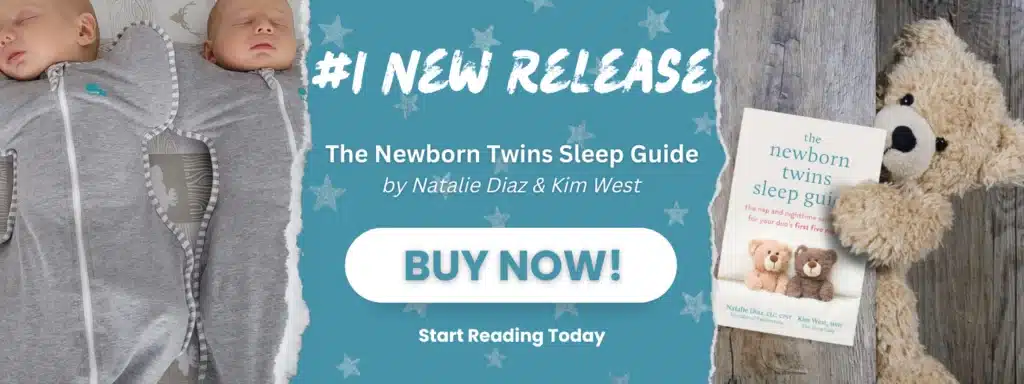
We considered a second tongue tie release. However, in order to qualify in the hospital clinic, she had to be latching multiple times per day and have at least 50% of her daily intake be breastmilk (either from the breast or the bottle). These requirements felt like an insurmountable hurdle. Perhaps if I had one baby, I could have persevered. But attempting to meet those requirements while also exclusively breastfeeding a second 2-month-old was too much.
There were a lot of tears in those weeks from all 3 of us.
Eventually, I accepted that Twin A would be exclusively breastfed – she gave me no choice in the matter. The harder pill to swallow was that Twin B would exclusively bottle feed. By 3.5 months, when my mother left us to return to the US (she came to live with us in London a week before the birth), I finally had to give up expressing and turn entirely to formula. There just were not enough hours in the day for sterilizing, laundry, burping, feeding, changing, sleeping, expressing and eating without another pair of hands.

Acceptance
I can look back now and tell you without irony that this was the best thing that could have happened to us as a family. I have learned that raising twins in a healthy, happy home is not about fairness or equality or doing everything the same. I have two children who happen to share a birthday. But they are individuals with their own distinct personalities, likes and dislikes, needs and wants. Being the best parent to each of them is about getting to know them for who they are and responding to their needs.
I am only one person, and when they both need me at the same time, I inevitably have to make choices. That means tolerating more distress, accepting more risk at the playground, and relying on other caregivers to step in. It is a constant mental, emotional, and physical juggling act to determine whose needs are most acute.

Ultimately, breastfeeding one twin and bottle feeding the other has benefited our family. Most importantly, my husband could take the lead on feeding Twin B, and we were able to split night duties to avoid double the wake-ups. His bond with Twin B and his confidence in being able to meet both babies’ needs from an early age was priceless. We didn’t have any local family support once my mother left, and we couldn’t afford to hire regular help. It was down to us, and we both had to be ready for anything!
What I Learned About Myself
Beyond that, I developed empathy and appreciation for both feeding experiences and the huge range in between. This helped me connect and support other mothers in my local community and release many of my ideas about what motherhood “should” look like. This has allowed me to be kinder to myself and more flexible and adaptable as other parenting challenges arise.
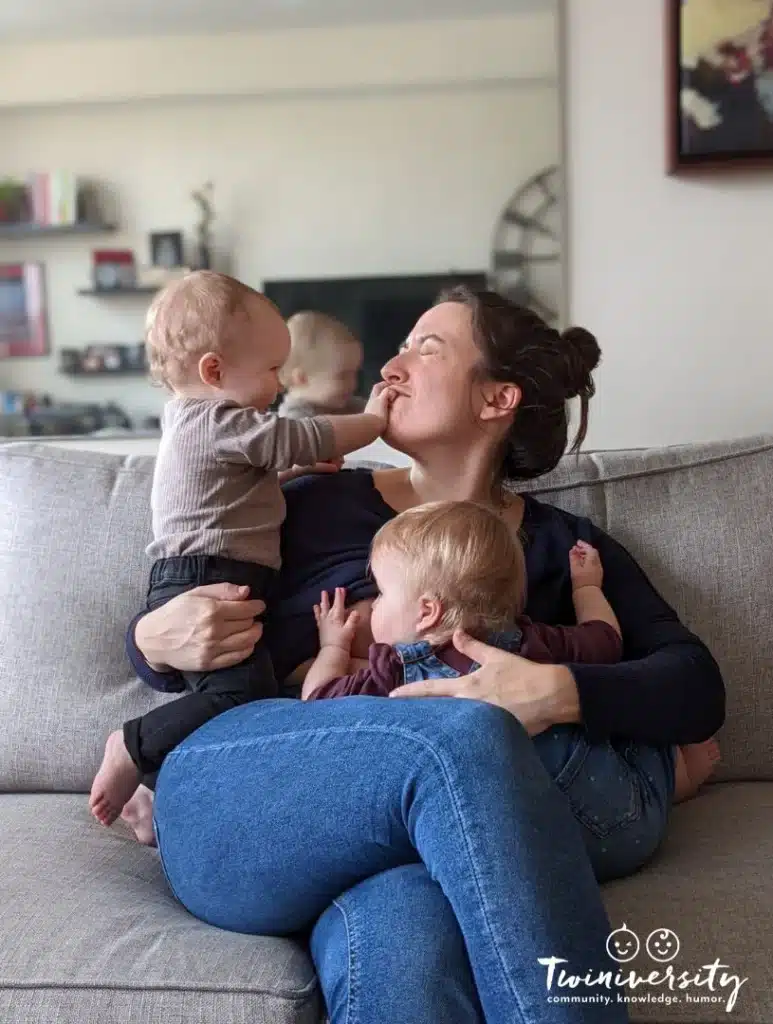
My best advice for all the twin mommies is to let go of the pressure you have put on yourself (or society is putting on you) to treat your twins the same. Not only is it impossible, but it will also not produce the equity you truly seek. Ultimately, your goal is to raise happy, healthy children. That means meeting them where they are and listening to them. Trust your instincts, and don’t be afraid to look at decisions holistically for your family. Mama, you’re doing an amazing job.

Courtney Cochrane recently returned to her home state of New Jersey with her husband and 3-year-old fraternal twin girls after spending the past 8 years as an ex-pat in London, UK. She is a mental health professional and unapologetic millennial still clinging to skinny jeans and side parts. She is missing her Southeast London Twins and Multiples community which kept her sane through the early years of twin parenthood! She joined the SE Twins+ club in January 2022, when it reopened post-pandemic, and became a weekly playgroup volunteer and committee member. She is passionate about sharing knowledge, support, and hand-me-downs with fellow twin and multiples families! It truly does take a village. She is now settling back into life in the USA and enjoying Target runs, fresh bagels, and family support.

